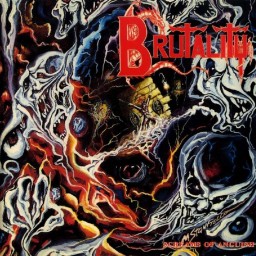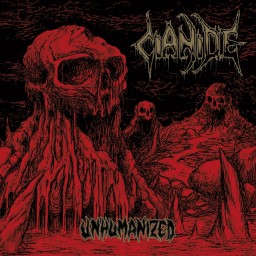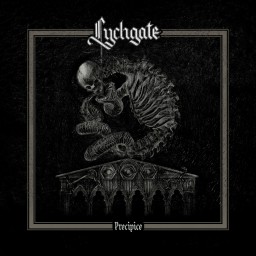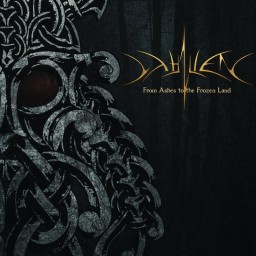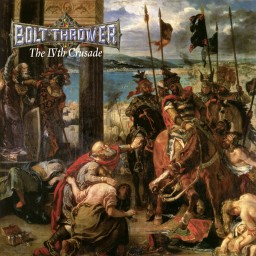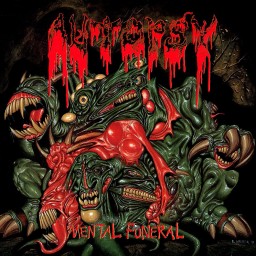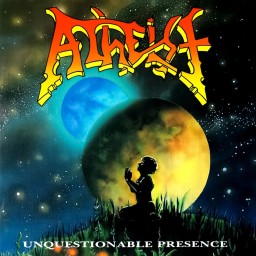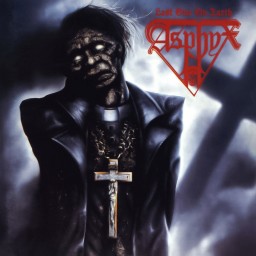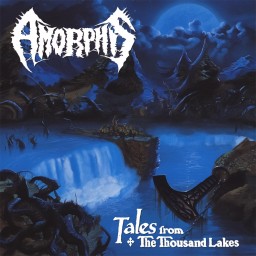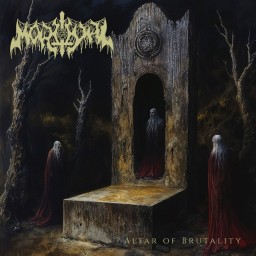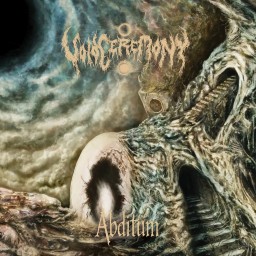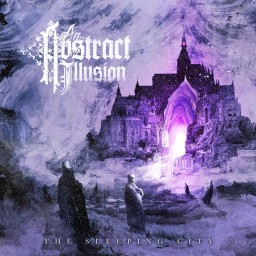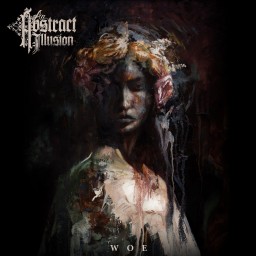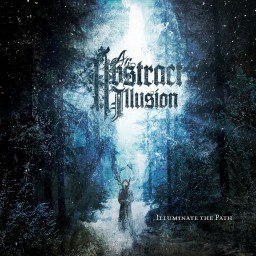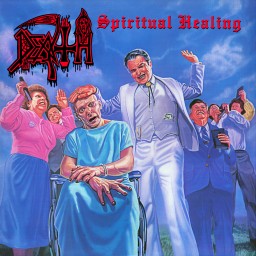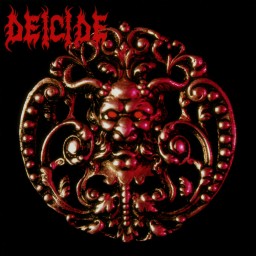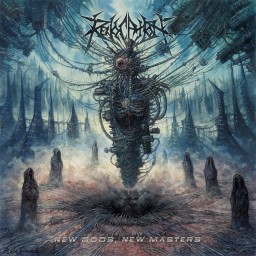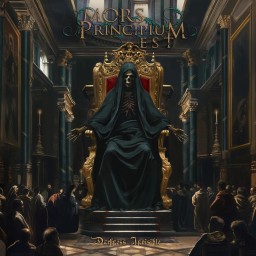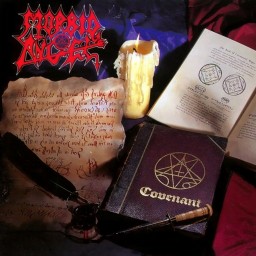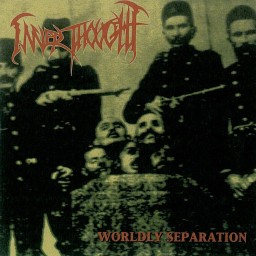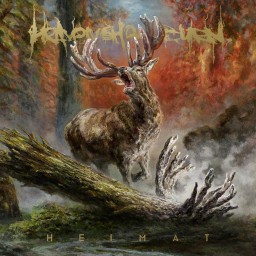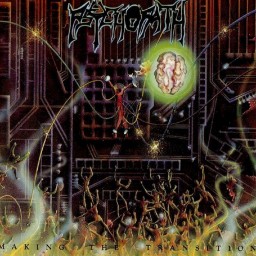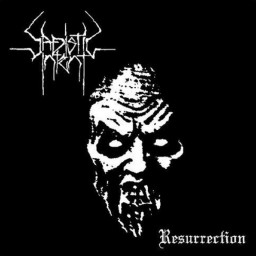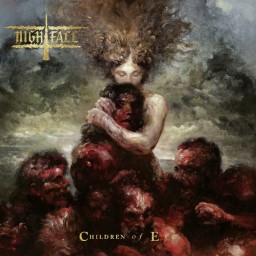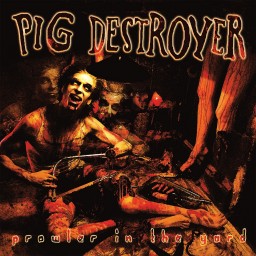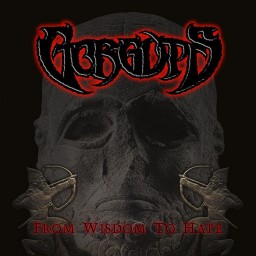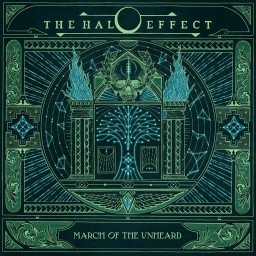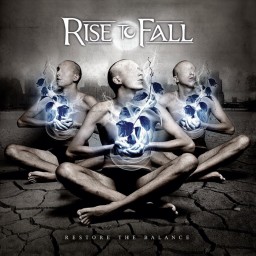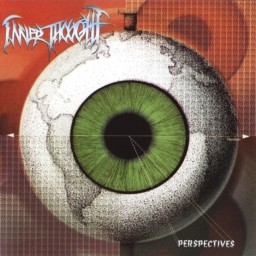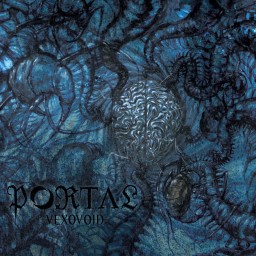Latest Reviews
Listening through Death's discography, I finally come to an album that is very much regarded as one of the band's best but that I never gave too much attention. After many, many spins this has come to be my favorite Death album. The perfect point in the progression of their sound, the very transition between the brutality of Leprosy and the progressiveness of Sound, here everything is in perfect balance. Coupled with stunning musicianship, amazing compositions and a very solid production, Human takes Death far ahead of the competition with a record that shows how much art can really be in death metal. I feel like this is a specially somber album in the band's discography, with some of their most aggressive (Suicide Machine comes to mind) and sinister (Lack of Comprehension) songs, and also the first to go deep into philosophical and existential lyrical topics, something that would become a staple in Chuck's later work. Honestly, there is an argument to be made for every song here as a standout, because every single track has something interesting and new to offer. Every instrument is also played flawlessly. Here the band starts to use very creative and distinct drumming, with quick metallic cymbal grooves that would also become a trademark of the later Death sound, and also veers toward a more technical and out there string instrumentation, specially in bass fills and dare I say "jazzy" solos (like the second one on Flattening of Emotions).
Well, to summarize, this pretty much scores perfectly in every way and the only reason I don't give it all stars is that I reserve this rating for albums that really touch me in a different way. It can't get much better than Human.
Disarmonia Mundi are members of the quarter-century-club and at this point, it's safe to say that they will never learn how to produce an album properly.
This was a struggle to listen to. Not because The Dormant Stranger is a poorly written album, but because the production is complete ass. The loudness war has taken full effect here and has been a staple of Disarmonia Mundi's music for a while now. So tracks that may have had potential like "Outcast" and "8th Circle" lose all of their grandeur by having brick wall soundscape. Nothing is allowed to breathe as the guitars just power away the entire time. The vocals are compressed to hell and only really ascend above the instrumental when the harmonies and vocal layering takes over. This would all be an issue on any record released in 2025, but could be forgiven if the mood was right, say for example this was a hardcore punk or metalcore record. The Dormant Stranger is not only neither of those things, but this record goes on for almost an hour! By the time I hit "8th Circle" at nearly seven minutes long, I was nearing the end of my rope. This band needs to streamline their albums OR write shorter songs more consistently. As it stands, it's an album that starts off underwhelming only becomes progressively worse the longer it goes on.
Best Songs: Illusion of Control, Crossroads to Eternity, The Dormant Stranger
Invictus are a death metal three-piece who formed in 2015 in Nagano in Japan. They play in an old-school style that plays very much to my death metal preferences, so it is unfortunate that I haven't come across these guys until now. They don't appear to rush their releases, with this being only their second full-length, following 2020's debut, "The Catacombs of Fear", and it shows because this sounds like well-written and well-rehearsed material that the individual musicians are apparently exceedingly comfortable with.
Musically there is a reach back through time to the late Eighties and early Nineties scene with influences from the likes of Bolt Thrower, Asphyx, Autopsy and early Death all shining through. The riffing is fluent and hard-hitting with some vestigial thrash metal elements underpinning the album's potency and inexorably driving the tracks forward. Like all the best old-school protagonists Invictus are also unafraid to drop the tempo into a doomier territory from time to time. The production is very dense, feeling like it is smothering and squeezing the listener and which possibly helps to make the album sound even more brutal than it really is. I say this because although it does sound damn brutal, it is actually also quite melodic (for want of a better word) and has some killer hooks in its riffs. However the foetid production always seems to subvert those hooks and presents such an atmosphere of filth and violence that this melodicism goes to work on a much more subliminal level, so you suddenly find yourself tapping your toes and nodding your head almost unwittingly.
This is quite a short album, by modern standards, with eight tracks and a brief intro clocking in at a touch over 35 minutes. With the final track taking up 8 of those minutes, the others are mainly in the sub-4 minute region, yet seem to have far more going on in them than such brief run times would suggest, a testament to the three guys songwriting prowess. The riffs are obviously the big draw here and there aren't many guitar solos but when there are they are pretty manic - check out guitarist and vocalist Takehitopsy Seki's frenzied shredding towards the end of "Altar of Devoted Slaughter" for proof. The rhythm section of bassist Toshihiro Seki and drummer Haruki Tokutake are both impressive here and their work is the foundation of all the brutality and filthiness that bursts out of the speakers and these two guys are definitely more than just supporting players to Takehitopsy's six-string antics.
I enjoyed this one immensely as it plays to all that I have grown to love about old-school death metal, the stampeding riffs, the foetid atmospherics, the chunky bottom end dynamics and the grizzled growls of subterranean demon vocals. One of my favourite OSDM albums of recent times that I will definitely return to time and again.
Absolute legends of riff-oriented cavernous Tech-Disso-Death release another masterpiece.
Immolation is such a special band because they are technical and dissonant, yes, but they never let that come before the fact that they are extremely dark, atmospheric and moody. In fact, they utilize technical and dissonant songwriting to further add disorientation and disturbance to the listener, but not so much so as to prevent the songs from being extremely memorable and digestible.
Unholy Cult is a continuation of the band’s previous sound, meaning you can expect some of the heaviest, densest, most well-composed music out there. However, I think the album does manage to stand out from the predecessors in some key ways. Chiefly, the atmosphere on here is crazy. Layers of dissonant guitars create a sublime cacophony of perpetually disturbed darkness that feels like a thousand hands dragging the listener into the depths of an abyss. It’s astounding how much they do with just a traditional Rock ensemble, as even without keys, pads, or symphonic elements of any kind, they construct masterful caverns of sound that feel absolutely massive and crushing. The interplay between guitars, both dissonant and harmonic, is nothing short of genius.
That’s not to say the other members of the cult are outdone. The drumming on here is flawless; incredibly varied, technical, complex, power… yet not overdone. In fact, the drums go about as far as they can without sounding like they are doing too much. The endlessly impressive fills and pummeling blast beats are spaced apart by slower or more conventional sections that last only long enough to ensure the songs are never without clear structure. The drummer also has a wonderful habit of playing technical parts with the sticks while keeping a constant, unbroken stream of double bass to maintain a cast-iron foundation to the chaos.
The bass adds a wall of pressure to the atmospheric and moody density, focusing on filling out the low end with an ominous weight that is not as immediately noticeable, but nevertheless just as important in ensuring the thing sounds denser than tungsten. The guitar leads tend to get quite high and piercing at times, so the 6-feet-under bass does a great job at complimenting and contrasting those. The vocals are also essentially perfect guttural growls, fantastically enunciated so each of the superbly written lyrics shine through. I can actually hear a few moments here and there where the vocalist just barely has time to breath between delivering lines and I love that so much because so many harsh vocalists who deliver fast screams will just do separate vocal takes for each line and throw one next to the other to compensate for the fact that they could not actually do such a feat in reality. I’d rather hear a little bit of natural struggle and know that it’s all real, like I do here.
One more thing that ties into the focus on atmosphere on this album – the band is a bit more inclined to flirt with Death Doom in a few spots. It’s lovely every time they do because they’re essentially Incantation on cocaine when that happens – twisted, cavernous walls of twisting and turning dissonant guitars.
Probably their most consistent album… perhaps my favorite thus far.
Like I said with my Nailed to Obscurity album review last year, undercard death doom bands have a mountain to climb if they want to retain any sort of relevancy anymore. Ethereal Darkness' debut album, Smoke and Shadows is a mostly pleasant, if a little boring, project that provides no inspiration to a genre that has been fruitful in the last couple of years. Granted, some of my criticisms can be thrown away when you consider when this album was released, but even by those standards, I cannot see this as a good thing. The death doom on display here is predictable and does not do much to separate itself from contemporaries. The standard for this genre has been raised by Fires in the Distance, Red Moon Architect and Aeonian Sorrow of late and I see no attempts to stand out and carve their own path here. Smoke and Shadows feels like the kind of death doom album that you throw on as background noise or as playlist filler. It sounds okay in the moment, but give it anymore of your time and you'll start to regret it.
Best Songs: Forgotten Shadows, The Light That Fades, Time
I like to see death metal grow into different places because it is a genre I sometimes find a bit monotonous and lacking in variety, and I can commend the effort in this record as there are passages I do like and find beautiful and it has a overall melancholic, dare I say gothic vibe that I enjoy. That being said, there is way too much here I don't like at all, so I can pretty much say it is not for me. I find the vocals pretty annoying and the neoclassical influences coupled with the power-metalish composition style give me a very pretentious impression, and a feeling that this is somewhat disconnected from what I feel metal should be. Also, what is up with this clean ass bass? This is the first time a death metal record has a very audible bass and I don't like it. It's also a pretty long endeavor, but fortunately I didn't get tired of it as there is enough variety in interludes and intros and what not.
Well, to summarize, I see this is a classic, but it's a classic in a style I dislike. Can't really see me coming back to this in the near future.
Here's another one that's pretty hard to write something new about. This is nothing short of a perfect old school death metal record: every track has something to say, be it a badass riff, a creative and memorable lead, a stink-face drum groove or some perverse vocal delivery. Production wise, I couldn't ask for anything more. Crystal clear strings with a brutal tone and great vocal mixing. The drum mixing is not really my cup of tea, as I prefer something louder and more impactful, but that doesn't take away any points. Atmosphere is absolutely on point, with a very gorey and dark vibe all around. Actually, I'd say this is one of the most cohesive and conceptually sound death metal records yet for it's release year.
Technicalities apart, what really shines in this release is the composition and the ideas. This has a sort of catchiness to it that I've only seen in Death records, but it sounds way more sinister and brutal in every way. After some few spins, I can recall at least something from every track, even hum along solos, which is something very, very rare for a death metal record. This is what sets it apart to me, the same way Death's Leprosy and At The Gates' Slaughter are set apart: records that are memorable as they are relentless. Not a single drop of brutality traded for poppiness, but still incredibly catchy music nonetheless.
As I said, pretty much every track here is awesome, but I particularly like the first and last tracks, with the last track around 5:00 part being a serious contender for heaviest shit ever, Incarnated Solvent Abuse with some of the best mid tempo death metal I've ever listened to and Carneous Cacoffiny for that groovy stink-face main riff. Awesome stuff I'm pretty sure I'll return to for many years.
I came to Gojira a little late given that I was well & truly in my electronic dance music hey day when their 2001 debut album "Terra incognita" was released so I didn't end up discovering them until around 2009 when Ben introduced me to the masterful "From Mars To Sirius" which I immediately fell in love with & still regard as a genuine death metal classic today. That awakening would very quickly see me making the effort to explore all of Gojira's other work & there was plenty of quality to get my teeth into too, if not any additional classics to compete with their 2005 pièce de résistance.
"Terra incognita" sees Gojira at their most deathly with their sound being built around a death metal core but still being progressive enough for a progressive death metal tag. There's also a clear groove metal component that ensures that the Frenchmen are kept slightly apart from their peers &, interestingly, I feel that it's this element that sees me being unable to ever really consider a record like this one for my most elite scores, despite the clear talent in the execution. The fairly technical staccato riffs are deadly tight with extreme competence on display in the precision performances & drummer Mario proving himself to already be very competent. I tend to like Joe's vocals more when they veer further towards your classic death grunt rather than a less intimidating groove metal one which is hardly surprising as the extreme metal scene is obviously my comfort zone.
It may not receive the praise that later albums like "The Way Of All Flesh" or "L'enfant sauvage" do but I think "Terra incognita" actually competes very well with them if I'm being honest & it can certainly be mentioned in the same breath as the underrated "Magma" too, although I think I'd probably have it slightly behind all three due to its inability to see me reaching for the classic card with any of the fourteen tracks on offer. Still, it's an underrated & generally overlooked part of the Gojira back catalogue that's well deserving of the attention of our The Horde & The Infinite members.
For fans of Hacride, Trepalium & Decapitated.
The death metal world practically worships this album, and it's so easy to see why that a child could do it. In stark contrast to the wild and wacky nature of their debut, Slaughter of the Soul is much more simplistic. This is not to say, however, that the album isn't good. The reliance on layout and melody is the tradeoff from the unpredictable riffage from the debut, as well as an acidic and pyrrhic production style. With extra accessibility, their songs are easier to get behind, but there is almost none of the poppiness you'd expect from your average Dark Tranquillity album. Everything here is brutal in its own way, slamming like hammers on drums, and the band made sure every song was a total jam. There's nothing too long or too short here, even when the songs are only two minutes. Everything is packed to the atomic level with death metal extremity untamable anger and an extraordinary sense of melody. Although the band once again writes an album with very little variation between the songs, they perfected the majority of everything else than a great album needs. In fact, this is one of the most well-produced albums of any genre than I've ever heard. It's a little difficult to believe that this was their swansong, considering they've grown in so many more ways than they've digressed.
93
To end my melo-death exploration for the time being, I'm going to tackle At the Gates. I'm aware that they're a death metal staple that's known for the legendary Slaughter of the Soul, which has largely been revered as a polished piece of pure putrid power. I also know that their debut has some die-hard defenders, claiming that the writing alone makes this a better album than overly polished works. Believe it or not, while many online metal communities consider Slaughter of the Soul the band's defining album, some places like Metal Archives and Metal Academy consider this album the better.
The first thing I'm gathering here is SCOPE. This album shoves a large number of riffs in your face, which largely maintain a high level of accessibility. Through the Gardens of Grief is just everywhere their debut's style will allow. I was worried at first that the album would largely sound like that throughout, and that it would be an exercise in style over substance, but Within made a point of bragging about sluggish doom and extreme speeds rather than solos, thankfully. It changes emotional direction into something quite somber. The album has very little to say in terms of genre-exploration, but justifies their level of creativity with these numerous skillful riffs and rhythms.
The production here is actually known for being less polished than many albums before, but that doesn't completely bother me as this is a more traditional and early brand of melo-death. Not exactly fair to expect diamond production on a debut, right? This production style has a very authentic feel to it. But this doesn't mean it's perfect. The album is in serious need of heavier drumming. It's certainly not bad by any means; in fact, it can be quite impressive. Claws of Laughter Dead (maybe I'm wrong, but that's kind of a shitty name) will prove this effortlessly. I'd rather drum like this guy does than Neil Peart.
Overall, this debut was a display of the band's extraordinary powers of riffage, being a single-genre marathon of how to keep an album going on that concept and actually remain consistently intriguing and accessible despite the lack of necessity for consistent layout and proper variety. It's extra rare to find albums like this that can do such a thing.
95
In an earlier review for Carcass's second album, Symphony of Sickness, I mentioned that there was less of the melodic strength that made the third and fourth albums so beloved. In this early goregrind release, as well as their debut, there's even less of that. This is one of those somewhat common examples of early 80's metal albums compensating for lack of creativity with absolute brutality, the way earlier movies by Wes Craven were. "Mature" content over substance. Now the funny thing is, like Wes Craven, the band grew as their career progressed, so by the mid-90's this was basically nothing more than a historical example of how much they grew. Despite a few cute tricks here and there, I predicted how the whole album would go after listening to Symphony of Sickness. Now there may be some charm to have in the lo-fi production. It's certainly a heavy piece. But the production also muddles things that shouldn't be muddled, which cements yet another weak point in comparison to future works. Basically, this overly "adult" album amounts to little more than an imitation album made by a bunch of children who think all it takes to be the best is to be different and "true to yourself" by "not giving into radio capitalism" or some shit like that. Fortunately, this was the last time they ever sounded like this. With 22 short tracks, they found a way to make a 37-minute album way too damn long.
52
I'm not one for goregrind really. In the long run, then I'd rather not educate myself in an entire genre dedicated to piercing the veil of acceptable gore by turning the most disgusting lyrics of all time into that much of a joke. I mean, it's one thing to have obviously fake pain splashing when you're cutting down b-movie zombies in an intentional cheese-fest like Braindead, but to keep bragging about it as if getting your fingers in between the very atoms that make up gore is how you get your kicks just isn't the kind of thing I think people should be spending months writing for albums. I rarely explore these kinds of bands, with a notable exception being the slam band Devourment.
Nevertheless, I occasionally go to classic acts like Carcass because of their melodic prowess and heavy say in the modern development of death metal structures, which isn't so much about the gore factor as it is about the melodies, production, brutality, etc. But before they were a melodic death metal band, they played around with goregrind, which I find interesting considering that the album before the melodic days would be their second and last album to showcase them partaking in their original genre.
Somehow bordering both death metal and goregrind without steering too far into Napalm Death signature deathgrind genre, this sophomore album is largely about having fun with the metallic sound and setting up a basic structure, so there's not a lot of variety going on. There's a very dirty, gross sound about the production that makes the album sound like it came directly from the underground, ready for vengeance or some shit. And in comparison to many a grindcore album, this one makes a point of consistent and enjoyable riffs rather than being random-ass and overly technical like a lot of modern grind does, allowing their sound to be both fun and grounded for the metal fans AND the punk fans. As well, the production never gets in the way of the band's playing. No, it expands upon the heaviness, which is exactly what an album like this needs. Speeds even fluctuate at an even pace, giving us enough time to enjoy what we have rather than just going off into 50 different universes in a single minute the way Doctor Strange does. Still, this DOES mean that this is a developmental album rather than an attempt at real art, which is still a good thing considering that the practice easily paid off.
Now the internet says that this is slightly worse than the two Carcass albums everyone knows and loves: Heartwork and Necroticism. However, I'd say this is about on par with Torn Arteries. It's a good album that proved that the band knew what they wanted at the time, but it's also a reminder that Carcass made the smart move on the next album and expanded their sound away from goregrind. The thing is, while this is a fun album with a successful vibe, all the riffage is flatout OWNED by Carcass's later work, so I wouldn't put this on the same pedestal others put it on.
75
Despite not being a fan of melodic death metal or progressive metal, here I am writing a review for an album that is tagged as Progressive Melodic Death Metal. My interest in (trying to) check out all the feature releases each month has certainly paid dividends with The Infinite feature release having enjoyed a fair old amount of plays this past week. If I was pressed to sum up why I have enjoyed The Immortal so much, I would call out the rich and full sound that is on display. The album is by no means a perfect, or even complete package, yet it carries enough positive markers as it plays for me to continue to come back to it.
One of the unexpected positives for me are the clean vocals. A fan of the more aggressive style of vocals that occupy the more extreme ends of the metal spectrum, on this occasion the clean vocals work better than the more traditional growls. I have to agree with Saxy in that the harsh vocals are lacking somewhat. The opening track manages to hit this vocal sweet spot early on in the album and as it continues to play it almost becomes a contest between the two styles, with the cleaner elements a clear victor. If I then factor in other moments such as the groovy riff of ‘The Sojourner’ and the post-metal palate-cleanser that follows on ‘Moonless Sky’ as well as the excellent strutting of ‘The Hounding’, I soon have multiple positives to talk to.
I would however like the lead work to have more direction. What often starts off as luscious sounding injections of melody, never quite seem to expand into any established endpoints. This sense of going nowhere is frustrating, notwithstanding that there is plenty of melody still over the album as a whole. I do feel however that the standout moments as a result are limited and that more interesting lead work, as well as perhaps less harsh vocals would have helped here.
Omnium Gatherum are one of those Scandinavian melodic death metal bands that formed out of the second wave during the early 2000s and I've always found them to be one of the standout groups of that time. The music was slightly more progressive than its mainstream contemporaries like Arch Enemy, but still very accessible to that same crowd. Well in 2025, May the Bridge We Burn Light the Way sees this band fully embracing the cheesy side of the genre to its full potential. To me, I don't view this as much of a deterrent because Omnium Gatherum have been able to make solid music for just over two decades and now, not having to worry about being ostracized by the old guard, the synth leads and the strings and choir are more pronounced than ever before. Make no mistake, this record sounds cheesy as hell!
That being said, I can also see May the Bridges We Burn Light the Way as having a very solid base with strong choruses and excellent flow. The songwriting has become more streamlined and far less wasteful than on earlier albums. However, this can also be viewed as a downgrade since as a whole, the record feels quite safe; this album does not have a "White Palace" or "Deep Cold" on it. Now I can give Omnium Gatherum some leeway here; they are entering their third decade and innovation becomes less of a requirement after that much time. This feels like the "let it ride" album where Omnium Gatherum are contempt to stay from now until they eventually call it quits. I hope that isn't the case because I know that this band are capable of so much more, but as a single record, it's very good.
To me, May the Bridge We Burn Light the Way is AOR metal...and that is as much of a compliment as it can be.
Best Songs: The Last Hero, The Darkest City, Ignite the Flame, Road Closed Ahead
Reading various reviews of Mercenary online, I soon found myself looking at two factions of opinion. Group one, believe that this is a perfectly respectable Bolt Thrower record. Group two, believe the production job killed this one entirely. Although I would also add that most of either camp seem to acknowledge that this is the weakest album in the discography. As I have listened through over the weekend, I can see both camps arguments as being valid. The production on Mercenary is muffled, although I have heard much worse, and it is unclear even after multiple listens whether the album lacks power in the performance or whether it is robbed by the production job. I am finding myself in the production camp at this stage of my experience of the record, based on the belief that there is enough classic Bolt Thrower in the sound still, all with some prowess and heft behind it too, but there is an obvious dulling of the absolutely unstoppable force that came across on the previous two albums.
Therein lies another topic of contention of course. After two absolute bangers in The IVth Crusade and …For Victory, could anything match the standard set by those two records? I suspect not, certainly given that of the three albums that followed …For Victory, only the final Bolt Thrower album, Those Once Loyal stands out as being a highlight. When all is said and done, 1994 was very much the band’s peak. Much is also made of the fact that Karl Willets left the band after Mercenary, citing a lack of commitment and financial pressures. I cannot say that there’s anything about Willet’s performance on Mercenary that makes me think his heart was not in it though. My belief is in fact that he was just as potent as ever, the production job for me is the guilty party in any perceived shortfall in this aspect of Mercenary.
If I had to pick the weakest album from the Bolt Thrower back catalogue, it would not be Mercenary. Yes, there are better albums in the band’s kitbag, but it is my fundamental belief that Mercenary suffers from poor (not terrible) production. I prefer it to Realm of Chaos which if I recall correctly suffers from the same affliction. My choice for the worst Bolt Thrower album would be Honour Valour Pride, notwithstanding that Bolt Thrower on a bad day could still produce death metal that most other bands still could never hold a candle too. I have increased my rating of Mercenary based on this revisit by a whole half a mark, albeit the performance I suspect is at least a further half a mark on top that gets robbed back by the production.
My interest in progressive melodeath has boosted up ever since encountering the perfect discography of An Abstract Illusion. It was a sign for me to revisit some earlier progressive melodeath bands that I enjoyed yet abandoned a few years ago. In Mourning might just be the place for me to start in my journey of redemption, since that was probably the band An Abstract Illusion reminded me the most of. And I'm glad that the first Infinite feature release of 2026 is their splendid new album, The Immortal!
The album was recorded throughout the late months of 2024 and the early months of 2025, following up from The Bleeding Veil released 4 years prior. The Immortal may just have the best sound from the band in many years, sounding so sonic and organic. I can already tell how well-written the album is, in big levels. Slight touches of black metal are added to enhance the cold darkness. It finally saw the light of day at that year's Summer end, released via Supreme Chaos Records. As emotional as their earlier material was, the emotion has reached its greatest height in their quarter-century tenure in this offering.
Of the 9 tracks in this album, the title opener is a moody one-minute intro. "Silver Crescent" blasts off with crushing progressive riffing. Then the vocals enter, as aggressive power is blended with melodic harmonies. "Song of the Cranes" is more progressive while keeping the structure in control. The heavy verses with harsh vocals and melodic chorus with clean singing are a mix that has been used by many bands before yet still sounding unique.
"As Long as the Twilight Stays" is more emotional. Clean sorrow comes in first before more of the intense distortion and vocals. "The Sojourner" is the album's first single. It's the perfect song for anyone up for a lot of aggression with some melody here and there. "Moonless Sky" is an ethereal ballad/interlude, a gentle calm in between storms.
"Staghorn" bites down with pure heaviness, all in the guitars and vocals. "North Star" is an aptly titled song for a somber night trek in the northern lands. The melody and heaviness appear where they need to be. I also like the catchy clean chorus. The 8-minute closing epic "The Hounding" starts slow and doomy then speeds up with all its emotional power. The growls and screams touch my metal heart, and the different riffs and twists keep me up for more. Fantastic!
Emotion reigns supreme in the brand-new In Mourning album. The Immortal hits hard with its aggression and lightening this up with its melody. It's likely the most powerful the band has sounded in years, and with that, let's hope their music stays immortal!
Favorites: "Silver Crescent", "Song of the Cranes", "The Sojourner", "Staghorn", "The Hounding"
I'd say this is one of my favorite releases from the Florida death metal scene. It has pretty intricate, interesting sound, a somewhat cosmic vibe and a technical tinge that makes it standout from your Morbid Angels and Deaths. The album also has some creative decisions like duet vocals and non-metal interludes which makes the record as a whole distinguishable. The production is pretty much top tier for it's time and the composition/riffage is great, but a bit lacking in memorability. This is one of those releases that I remember liking a lot, but can't really recall any song in particular, and that is what really keeps me from giving an extra half-star.
Legendary death doom outfit, Cianide are one of my criminally underrated bands with them rarely getting anywhere near as much spin time as they deserve. This EP coming up in the feature release section this month has been a timely kick up the arse to remedy that for a few hours at least. Unhumanized is only a shade under twenty-six-minutes long and perhaps is not the Chicago trio at their absolute best, yet it is still a bruising and entertaining affair to listen to.
Coming out thirty-one-years after the band first got together, Unhumanized has the hallmarks of an established and mature band. The riffing sounds perfectly crafted and richly performed to accentuate the crunch and groove of the guitar of Scott Carroll. For a band with only one guitarist, he is clearly more than enough, and the mix lets him sit front and centre in proceedings alongside the barking of vocalist Mike Perun. The percussion is less prominent than the guitar and vocals but still does a fantastic job in the background. Check out the punky vibes on the title track for an example of how this is not just a standard death metal release.
Offering some of the best in extreme metal that the underground has to offer, Cianide give a decent enough acquittal of themselves on this release to pique the interest of any fan wanting to go and look at their earlier work. With a discography going all the way back to 1992 when their debut record dropped, this taster of the modern Cianide has enough of their familiar sound to tie it back to their earlier releases. Love me a short EP every now and again to whet the appetite for some further death metal listening afterwards.
The new Lychgate album is likely the last new release in metal that we'll ever get before the new year dawns. And with only over 24 hours before it becomes 2026 in my country, I thought this would be the right album to check out as the clock is ticking down. It's probably the most experimental album of the year, and one that further shows how well I can keep up in The North despite that clan being the least likely for me to ever join.
You want extreme progressive metal more twisting than a supermassive black hole? It's all in this album Precipice! What we have here is the deathly progressive metal of Opeth blended with the avant-garde black metal of Dodheimsgard. Rhythm and melody are covered within heavy riffing, clean leads, and classical keys. The vocals are pretty much what to expect in extreme metal, including chaotic growls and screams. It is also lyrically based on the philosophical works of Forster, Wells, and Eliot, specifically the dark bleakness of humanity's dependence on machines.
The intro of this 9-track album, "The Sleeper Awaits" sets everything up in a haunting fashion, as heard in the piano and orchestration. "Mausoleum of Steel" crashes in with dark aggression balanced out with progressiveness. The devilish harsh vocals in front of the orchestration and metal is so strange yet tempting. "Renunciation" is even darker, further into the center of the world. Leads and vocals unite for a dissonant sound alongside the bass and drums. It's truly a beast lurking in the shadows!
"The Meeting of Orion and Scorpio" turns into clean light tainted by eeriness. Seems like the beast is having its rest. "Hive of Parasites" is a spooky progressive 10-minute epic. It may take some time for listeners to get used to what's going on, but when you do, you can fully embrace it as it embraces you. The vocals stay harsh throughout this cavernous quest. "Death's Twilight Kingdom" has some piano and bass in the intro before the metal beast moves again. Everything keeps changing before you can get a sense of what's happening, like something appears, disappears, and reappears.
"Terror Silence" has a more straight structure that's easy to understandable. Still they have the Opeth-like aspect of shapeshifting riffing. "Anagnorisis" adds to the album's lyrical focus of discovering the true existence of someone else rather than your own. Everything's so dark and deadly, and for me, it's my sweet dessert. Doom is impending... And it comes in "Pangaea". For just 3 short minutes, you feel the black hole engulf you in darkness and death. Then before long, your journey ends on a satisfying note.
Like the edge of a cliff that the album title means, Precipice will give you the feeling of hanging on to your life. It's an experience so unsettling yet pleasant. And in the end, it's all worth leveling up your metal soul!
Favorites: "Mausoleum of Steel", "Renunciation", "Hive of Parasites", "Death's Twilight Kingdom", "Anagnorisis"
Getting back into the epic folk metal zone that I was in 10 years before this review when I was into the more melodic metal genres, while still taking on the heavier modern metalcore, has made me quite curious about what those two genres would be like mixed together. We already have Equilibrium doing that with their later material, but before that was the modernized folk stylings of Ithilien...
Named after a region in Gondor from The Lord of the Rings, this Belgian band released their debut From Ashes to the Frozen Land in 2013. Celtic-infused folk metal is blended with modern melodeath similarly to Eluveitie, albeit with some Scandinavian viking/black metal elements.
The intro "Battle Cry" is a nice gentle start. When Celtic bagpipes come in, it sounds like something out of the Braveheart soundtrack, at the same time fooling some listeners into thinking is the beginning of a new Dragonland album. Punching through is "Unleashed", unleashing some Nordic melodeath power, sounding blackened in the vocals and blast-beats. Getting a little calmer while staying heavy, "Rebirth" is more mid-paced with beautiful leads.
A long-ish interlude "Sealed Destiny" comes in. I feel like it shouldn't be placed so early, but it's fine where it is. The first of two 6+ minute epics, "Through Wind and Snow", is a grand example of folk-fueled melodeath alternating between fast and slow, with similar vibes to bands like Kalmah, Swallow the Sun, Mercenary, and Hope for the Dying. Also will those crickets stop chirping at the end?! It's not boring at all! Again shining with speed is the other epic, "Reckless Child". No problems there! "Drinkin' Song" I also enjoy for its upbeat fun. I'm glad to not let seriousness get the best of me.
"Mother of the Night" is another fast standout. But then comes the more repetitive "Stare Into the Deep", though it's not too bad. "Everlasting Dawn" is the most blackened gem here. Love that one! "A World Undone" ends up being a slight letdown, but it doesn't affect the album's perfect score. "Northern Light" ends the album as another bagpipe instrumental, this one as long as that second interlude.
With their debut From Ashes to the Frozen Land, Ithilien has the potential to expand the boundaries of epic folk/melodeath. It's for anyone up for this kind of blend, and there's more of that in their next album, when they add some metalcore to their cauldron. Enjoy some modernized folk metal!
Favorites: "Unleashed", "Through Wind and Snow", "Reckless Child", "Drinkin' Song", "Mother of the Night", "Everlasting Dawn"
Bolt Thrower has something very interesting going on with it's songwriting and themes. They have a very characteristic minimal composition style: just a couple of simple, mid-paced riffs arranged in a logical way with enough beat variations to back it all up. Throw some badass growls over it and you have Bolt Thrower. Now, that is not to say that they are overly simplistic or boring! This is very heavy hitting death metal that in some way says something important about the genre itself. It's like boiling down the style to it's bare fundamentals and applying them with precision, and because of this the whole thing is a masterclass in efficient songwriting. But above this, I'm very interested in how this couples very, very well with their themes and aesthetics. Bolt Thrower doesn't care much about occultist fascinations or hyper-violent, gore-ridden fantasy. It's theme is the very real and brutal violence of war, an unquestionable and immutable truth. Coupled with their mid-paced, martial sound and minimalist precision, the outcome has a monolithic, eternal quality to it. That is something I can very much admire and look up to, because it is in fact very artistic, aside being awesome heavy metal.
Well, why the mid rating then? Unfortunately I do have some problems with this, which I guess is their most revered release. While there are some very good songs here, particularly Where Next to Conquer, As The World Burns and Spearhead, I do find the album too long and somewhat samey, making me lose interest a bit towards the end. Also, I don't like this production at all. The strings sound very bassy and glued, which I do like, but there's a critical lack of high end in the mix, and the drums sound muffled and don't have enough impact. That's all very unfortunate, because I actually want to like this album, the songs I enjoy are badass and awesome, and the cover art and title are incredible. Such a cool looking album, but unfortunately a let down to me. I'll be searching for a Bolt Thrower album that I can get behind and praise, because the band is pretty interesting.
What can be said about Mental Funeral that hasn't being said? Truly a foundational pillar of death metal, specially of the doomy variety, and it doesn't disappoint. I do prefer the sludgier and rawer debut, but this is undeniably some disgusting and skull-crushing death doom, with tons of memorable riffs that can't be ignored.
I can't say I'm really a fan of Atheist. Piece of Time was a kind of a let down to me: I can see them being ahead of their time in complexity and technicality, but the band just sounds so convoluted and seems to trample over itself to the point that I don't really enjoy the album very much. This release on the other hand, is a whole other beast! The band sounds somewhat lighter, with a clearer production and better execution, particularly on the vocals, which sound way more on point. Composition wise, they really went through the roof, leaning very heavily on their jazz influences to make what sounds pretty much 50-50 death thrash and jazz fusion. This was very much the correct decision, as this is where the band's insane musicianship and chaotic nature really gets to shine it's brightest, the result being some of the most interesting metal releases I've ever heard, perfectly balancing awesome complexity, sheer heaviness and plain fun. Honestly, not a single bad minute on this, absolutely incredible record.
I always saw this album cover pop up on metal discussion online and was somewhat intimidated with the 2000's looking fonts and the gritty Jesus painting, which for some reason spelled "disturbing" for me. This is pretty funny, because this release is actually some of the catchiest shit you can get! Really tight, with accessible composition, crystal clear production and very, very catchy riffs. Some things here remind me of late era Death with the techish riffs and high register vocals, and that's a pro for me. Some people might be put off by the metalcoreish vocals, but I wouldn't say pass to this even if I was a die hard metalcore hater. I do think the tracklist is pretty front heavy tho - the early run from Blinded by Fear to Suicide Nation is insane, but the B-sides kinda fall off to me and I tend to doze off a bit. Maybe would prefer it as an EP.
God, I do love me some death doom. Composition and riffage-wise, this is pretty much peak old-school death doom metal. Half awesome thrash and half crawling doom, with a lot of filth and heavyness. The tortured and demented vocals are also a big standout, reminding me of Autopsy and Velho's first EP, two of my favorite extreme metal endeavors. I do find this release to be a bit samey, but nothing too much to the genre. All in all, great stuff!
The only thing keeping me from an extra half-star is the production, which is not really my cup of tea. I do like the drum sounds and the vocal mixing, but the strings are too scooped and high-end to my taste. They do remind me of swedeath chainsaw, which I'm a fan, but I really think it lacks bass.
This is without a doubt one of the most unique and interesting death metal releases I've listened to so far, and honestly the band executes it very well. The ideas that flow from death, folk and even hard rock match and blend nicely, resulting in some very tight and fun stuff. Being pretty much my first time with melodeath, I was also surprised with how light and mellow this stuff is (compared to it's more brutal cousins, of course), and although it's a metal release, to me it's more on the rock n' roll side of things, particularly with some more danceable sections, keyboard solos and what not.
That being said, not really my thing. I do commend the band on the creative effort tho, considering this very exceptional, and I can see myself returning to this some day I'm wanting something light and fun.
Throughout the years, I can honestly say that I've never had an issue with In Mourning. They have made some pretty solid progressive death metal throughout the 2010s, but every time I visit their music, it either comes at a time when I'm not really interested in that style of music, or another, more potent progressive death metal album has just released which keeps my attention longer. The Immortal is likely the first time I've been able to fully enjoy an In Mourning album and coming to realize just how good they are. The album might have progressive as a primary genre tag, but if you're expecting the kind of wonky, abstract prog metal of Dream Theater or Between the Buried and Me, you'll likely be let down. The songwriting is very solid with some very good melodic themes and dynamics. The growth of some of the themes might be a little lacking, but tracks like "Song of the Cranes" and the closer "The Hounding" show that fully developed motif. The album as a whole is a brisk listen with the expertly placed "Moonless Sky" interlude. My one complaint, which isn't so much of a complaint more than it is an observation, is Tobias Netzell's harsh vocals. For a death metal album, they do feel a little bit on the weaker side; they almost remind me of Matt Heafy of Trivium, which likely means the use of the fry vocal technique. It isn't a determent to the album; in fact, it probably gives the heavier sections a little bit more character than other similar death metal albums, it's just something I noticed that caught me off guard.
This record won't win any "heaviest albums of 2025" awards, but for a few moments, The Immortal was a captivating listen. The fullness of the instrumentation, combined with some very subtle progressive song structures make it stand out. Like In Vain last year, it's surprising that this album made it here as late into the year as it did, but better late than never I suppose!
Best Songs: Song of the Cranes, The Sojourner, North Star, The Hounding
P.S. I thought for sure that I had reviewed this album before once I saw the album cover. It bears a striking resemblance to ...And Oceans The Regeneration Itinerary. Just a friendly warning for those wanting to check this out.
A relatively new name on the death metal scene, Mortual hail from Costa Rica and hold true to the legacy of the death metal of the Americas. Being a completely new name to me I went back to their earlier EP to get a feel for the band and found it to be a little bit messy with a poor production that saw the tracks descending into a bit of a quagmire of identical-sounding noisiness. Thankfully on this, their debut full-length, the production issues have been addressed and that has revealed a much more accomplished band than was originally projected. The title alone should be an indicator that, despite hailing from elsewhere in the Americas, we are definitely on Floridian territory here with Morbid Angel obviously being a touchstone. Their sound also incorporates the abyssal, thunderous quality of the likes of Autopsy and, probably more pertinently, Incantation which feels like it actually intensifies the brutality the band serve up.
Opening up with an absolute brute of a track in "Mortuary Rites" Mortual set out their stall in no uncertain terms with the track veering from an almost black metal-ish, lightning fast tempo to an ominously brooding crawl and back again all in the space of five minutes of thunderous riffs and battering drum patterns. I appreciate the variations in pacing and am always up for a drop into a doomy tempo as a respite from the blitzkrieg riffs and machine gun blasts. Guitarist Justin Sánchez Barrantes, aka Justin Corpse, doubles-up as vocalist and possesses an excellent guttural growl that is one of the real highlights of the album for me, his sulphurous belchings drenched in foetid filth.
The riffs are fine but, in truth, there weren't really that many that hit me hard and stuck for long and I would like to hear a few more that rolled around for a while in my head later. The guitar soloing is pretty intense and mercurial and is certainly a strong point, providing a manic energy to what is already a pretty stoked atmosphere. In all honesty though, there isn't anything here we haven't heard many times before, so what you think of the album depends on whether you are happy to hear a band playing a well-established style of metal very well or if you place more emphasis on the search for growth and experimentation in your metal. Me, I am quite at ease listening to a technically adept band with a deep understanding of the genre in which they ply their trade and an album that enhances the legacy of the giants who influenced them.
The amount of progressive metal I've been exploring in the past few months has been some of the most melodic in years. While I still enjoy djent bands like Tesseract, Textures, Vildhjarta, and VOLA, I've gotten back in touch with the material of melodic bands ala Symphony X Japan and discovered similar bands like Andromeda and Threshold. Even a deathly band like An Abstract Illusion can have profuse melody, and that provides the bridge needed to check out this release from a heavier band...
Abditum, the new album by experimental progressive tech-death band VoidCeremony, is filled with complex chaos. It's an astral journey through labyrinthine structures and riff technicality. However, the cohesion may be a bit off, causing the journey to spread out in fragments.
We get an interesting start with "Inevitable Entropy", a 45-second intro that sounds very well like it's been taken from the Old School RuneScape soundtrack. Then we swing into the chords and grooves of "Veracious Duality". The amount of different tempo changes is quite nuts, exemplifying their experimental approach. Then midway through, they break boundaries with their revival of the classic prog-death of Atheist. Truly devastating technical carnage! "Seventh Ephemeral Aura" is another excellent composition, letting out the complex talent of guitar duo Garrett Johnson and Jayson McGehee, and I'm talking about dynamic riffs and solos. It's like a more deathly take on early Between the Buried and Me, complete with out-of-this-world chord structures.
"Dissolution" is another interlude, having just useless jazzy guitar noodling. This probably would've been better and more enjoyable if it was placed in the middle instead after only two tracks. It just breaks the flow appearing so early. Actually, scratch that, "Despair of Temporal Existence" sounds a little too tight and repetitive, and it's only under two minutes long despite being a metal track. Either get longer or get out! "Failure of Ancient Wisdoms" has the deathly progressiveness of The Faceless. It's more cohesive with the guitarwork not having too much force, but it doesn't impress me enough to be memorable. Not a failure yet not a winner.
Then we have the short yet progressive instrumental "Silence Which Ceases All Minds". No time is wasted at all, with some of the best soloing here. It's just full speed ahead with drummer Dylan Marks practically obliterating his kit. "Gnosis of Ambivalence" is another highlight continuing all the vicious aspects the previous track has while adding in creativity in the vocals and riffs. The outro "Elegy of Finality" ends the album the same way it began, with its odd and confusing keyboard-symphonic presence.
All in all, Abditum has potential to be a progressive tech-death adventure. It's just that the under two-minute tracks are either unfitting filler or too short to stand. But I guess they're to make sure this isn't an EP. Nonetheless, the highlights should impress any fan or newcomer of the genre. Just try to ignore the poorly executed moments....
Favorites: "Veracious Duality", "Seventh Ephemeral Aura", "Silence Which Ceases All Minds", "Gnosis of Ambivalence"
It's safe for me to say that An Abstract Illusion may just be my new all-time favorite band. Each and every one of its 4 releases is a 5-star monumental masterpiece. And it shows that my love for extreme progressive metal won't die soon. The perfect streak continues yet again in their new album The Sleeping City!
The 3rd album from this Swedish blackened progressive melodeath band is another flawless journey. The synths and atmosphere wouldn't be too far off in a soundtrack for sci-fi film franchises like Star Wars and Blade Runner. The heaviness is also fitting for the psychology of humanity. You know the cities that never sleep, like New York and Vegas. Whichever city is referred to in the story is the opposite that, and one to explore if you dare...
The first of the 7 songs here, "Blackmurmur" already cuts to the chase. No 3-minute intro, just a swift entry into one of 3 epics that each last 11 minutes long. Those keys appearing in front lead into melodic riffing for a grand start. The momentum is kept in shape by the heaviness and melody battling each other in the atmospheric wasteland. Truly a vision emphasized by the guitars and keyboards! "No Dreams Beyond Empty Horizons" starts off clean in the guitars briefly, then comes the heavier storm. The guitars and drums strike as the harsh vocals slash, with some light from the cleans. Each side of the coin outshines the other while maintaining the balance. Simple yet complex! "Like a Geyser Ever Erupting" is the song that, after a few years of me stumbling across scattered tracks, has given me a "LISTEN NOW!!!" kind of demand. The fantastic prog-death erupts like a volcano throughout the first two minutes before clean sections starting popping up. By the end, the storm of aggression would indeed tear down the holy mountain mentioned in the previous album.
"Frost Flower" is a smooth track with dreamy melody coming from the synths and clean vocal harmonies. It's not always warm when the cold wrath returns for some time. Still a pleasant break from the storm. "Emmett" is the second 11-minute epic, and when the storm comes back, it's absolute complex rage! The guitars, leads, and keys are all embraced by the chaos that only become somber by the end. Incredible!
"Silverfields" is a short under 4-minute keyboard interlude with some metal at the last minute. The 10-minute title finale starts off heavy in the rhythms. Keys and cleans are still around for the last bit of sanity before all is consumed by a deathly black hole. And then it all ends with piano melody floating in the empty void.
The Sleeping City is filled with the fury, melody, and complexity all expected in blackened progressive melodeath. It's the kind of offering that would make an instant classic and please many more listeners than before. There's enough melody for the softer listener, enough brutality for the heavier listener, and enough intricacy for the more progressive listener. Basically a hidden artifact of progressive melodeath. This will make my top metal albums of this year list for sure!
Favorites: "Blackmurmur", "Like a Geyser Ever Erupting", "Emmett", "The Sleeping City"
An Abstract Illusion is an underground metal band from Sweden, but it is with this album Woe that the band's popularity started to grow above ground to some extent. They've already made progressive death metal history with Atonement is Nigh and Illuminate the Path, and their next album continues that perfect streak. Of those 3 albums though, Woe gets the golden medal!
While the sound here is generally atmospheric progressive tech-/melodeath, other different genres are incorporated. Sometimes it leans into blackened deathcore in the tremolos and breakdowns. Don't get it twisted, this ain't Lorna Shore! The brutality is balanced out with melody from the guitar harmonies and clean singing.
Beginning the album is the intro "The Behemoth That Lies Asleep". Just like the previous album's intro, it's 3 minutes long and starts slow before cranking up the metal. "Slaves" also follows that similar pattern as the heaviest and most deathly song here. "Tear Down This Holy Mountain" is the first of two 10+ minute epics. After a haunting rising intro with clarinet and spoken narration, the heaviness comes back on, with lots of experimentation.
"Prosperity" segues from the previous track, sounding more catchy especially in the breakdown. "Blomsterkrans" is quite long for an interlude at nearly 6 minutes, but it's nice and peaceful with background cello, violin, and a Swedish voice sample.
Heading into the final leg of the album, "In The Heavens Above, You Will Become a Monster" is a 14 and a half minute epic with some of the best progressive death metal I've heard in my life. It doesn't feel too long, and there's nothing repetitive. All just solid variety to let the time fly by! The finale "This Torment Has No End, Only New Beginnings" can be embedded to the previous track to make a 24-minute epic. That song title is relatable for me planning to start a new chapter of my life, except for the "Torment" part.
All you can find in progressive melodeath is right here in this hour-long trek of Woe. I can't find anything I would consider filler here. All this work must've been really worth it, considering the 6-year gap since their debut. It might just be a new beginning for progressive metal in the new decade!
Favorites: "Slaves", "Tear Down This Holy Mountain", "In The Heavens Above, You Will Become a Monster", "This Torment Has No End, Only New Beginnings"
I've only just started listening to An Abstract Illusion full-time after a few small glimpses of them over the years via some songs in the Infinite playlists. Nearly a decade after forming, and two years after their EP, they've released their full-length debut Illuminate the Path. Perhaps the best album of 2016!
As I've mentioned earlier, the band's style is basically progressive melodeath with elements of atmospheric black metal. I guess a more accurate description would be more complex. Speaking of complex, that's how I would describe the Opeth-esque progressive structures, standing side-by-side with the extreme drums of Fleshgod Apocalypse and the epic atmosphere of Wintersun. Not as many symphonics as those latter two bands though, but everything else comes together in a beautiful offering.
The 3-minute intro "Breathe. Create. Beauty." picks up where the EP has left off, with the same melody as the end of the EP's final track. Then everything rises with the atmosphere of both Hopesfall and October Tide (two different bands from each other). Then we blast off into "Abode of a God". The deathliness of melodeath bands like Dethklok, Ex Deo, Kalmah, and Omnium Gatherum and mixed together in a progressive cauldron that you would really want a taste of. The best vocals in this album come together in the highlight "Drop This Planet of Dust". I love the clean vocals when they blend well with the progressive melodic black/death elements, especially that dimensional section from the 4 and a half minute mark onwards. There are fantastic progressive influences from Omnium Gatherum and Persefone, as well as those other aforementioned bands. Delightful melodeath-inspired progressive metal!
The title track is the first of 3 lengthy 10+ minute epics, and it's more progressive, around the same level as Textures. There's one song with lyrics written in Swedish instead of English, that being their next epic "Vakuum". Apparently it was written quite early on in their career, and it's probably the best one of the entire album, possibly by the band. The intro is so beautiful, as is the rest of the song.
"Talvatis" is another short interlude with doomy atmosphere coming from Black Sun Aeon. "Skeletons of Light" is the epic of the epics, at 16 and a half minutes, with one of the best ending sections. I still prefer that previous epic though. Their bonus cover of Windir's "Svartesmeden och Lundamyrstrollet" shows them doing justice to the original.
Now before I conclude, I just wanna say impressive the band members are, 3 musicians with two different roles; guitarist/bassist Karl Westerlund, keyboardist/clean vocalist Robert Stenvall, and drummer/harsh vocalist Christian Berglonn. They've all done a spectacular job with their top-notch skills. Of course, Bergloon would pass drumming duties to Isak Nilsson for live shows. This underrated band made another grand masterpiece that is Illuminate the Path. Let the complexity and emotion light the way!
Favorites: "Abode of a God", "Drop This Planet of Dust", "Vakuum", "Skeletons of Light"
It took me a long time to fully appreciate the value of this album because Death was such a monument in the history of death metal that each work required quite some time to be digested in my soul. For the first impression, Spiritual Healing is quite mediocre, especially compared to the albums succeeding it. However, once you reclaim your mesmerized brain after the four albums the band put forward, you actually realize that Spiritual Healing is actually fed with so much raw emotion blended with old-school horror.
Lunatic asylums, hypocrite priests, medical nightmares, and a world full of conspiracies... A mind that is shattered between the morbidity of reality and the games of its own hallucinations.... This album is overall quite psychological as much as horrific. Rather than "healing", it is almost dissecting "spirituality". Both lyrically and musically, the album tells us how our spiritual existence and the material world surrounding it became a stage that degrades our physical and mental integrity, eventually "Altering the Future" within the world of "Genetic Reconstruction". Therefore, Spiritual Healing can be defined as the first album on which Death, or specifically Chuck Schuldiner (R.I.P.) starts to "philosophize" death metal themes.
Years after this album, Schuldiner would say in an interview: "Reality is far more evil than a demon". Yes, Spiritual Healing is the beginning point of this realism.
In terms of the band's discography, Spiritual Healing plays a key role in the musical evolution of the band, as it was on this album that the first attempts at later experiments and progressive trends that would put Death into a legendary category were made.
Musically, the highlight of the album is the lead guitar duels of Chuck Schuldiner and James Murphy. Such collaboration is exactly what makes the album quite melodic in both riff and solo arrangements, without sacrificing death metal identity.
It may not be one of the highlights of Death's career, yet it is definitely a "must-have", both for the band and for the fans.
Trivia: Chuck's vocals in this album are the favorite "Schuldiner vocals" for the ex-Morbid Angel frontman, David Vincent. If you carefully listen to the vocal style in Blessed Are The Sick, you can easily hear the influence.
The legendary debut of the Florida death metal band Deicide was not a small issue. Many extreme metal bands were around at that time, claiming the title of "the most satanic and blasphemous band the world has ever seen". Bands such as Morbid Angel, the early phases of Immolation, Incantation, the Norwegian and Finnish black metal circles, etc., indeed created some of the most devastating albums in support of that claim. However, let's admit that none could sound as furious, satanic, and possessed as the early era Deicide. Indeed, the early Deicide was something else.
As soon as you start to listen to Deicide, you open the gates of Hell and see how morbid, vengeful, dedicated, and scary could be the world of the Biblical Satan. Inspired by the atonal and cacophonic lead guitar work of Slayer, combining Dave Lombardo's style with non-stop blast-beat attacks, and surrounding such instrumentation with the themes of Possessed's Seven Churches or Sarcófago's I.N.R.I. , Deicide became the epitome of "satanic death metal". Last but not least, you also have to give credit to Glen Benton for the identity of this album. Simultaneous manifestation of brutal and scream vocals together with vulgar and hyper-offensive lyrics delivered by Benton was even above the standards set by Morbid Angel via Altars of Madness.
Once you listen to the songs like "Sacrifical Suicide", "Crucifixation", and "Carnage in the Temple of the Damned", you suddenly understand that this album is not a joke or a cartoonish satanic cookie monster. No... With this album, Deicide basically showed their middle finger to those who claim themselves "satanic" and said, "Really? Let's find out who really is...".
For some, the album may sound a bit repetitive after a few songs, but this also contributes to the overall ambience created by the album. Due to the intense and non-stop violence delivered by the band, the listener may easily become numb, like after consuming too much hot and spicy food, you can't feel your lips. This "satanic lethargy" is the purpose of the album.
In the end, it would not be wrong to say that Deicide was one of the most, if not the most, evil-sounding and nefarious death metal records a band could create.
New Gods, New Masters is one of only a handful of death metal albums that I have entertained over the course of 2025. In a year that has only seen me focus on death doom as part of my discovery of new music in The Fallen clan, conventional, technical and progressive death metal has not been on high rotation over the past twelve months. If I am honest, Revocation hadn’t piqued my interest with any of the previous releases I had heard, although I cannot say with hand on heart that I recall listening to a full length of theirs in recent history. It was upon hearing the chug fest that is ‘Confines of Infinity’ on an interview with Dave Davidson that my ears pricked up to the promise of some hard-hitting death metal. Seeing that one of my death metal heroes, Luc Lemay was making an appearance only enhanced my urge to give New Gods, New Masters a listen.
Now, I cannot pretend to be a massive fan of technical death metal. Despite owning all Death albums on physical format, I do have to be in a particular mood to put on Individual Thought Patterns, for example. Whilst my guard was up going into this Revocation record, having heard many times how proficient a player DD is and fully expecting an expansive wank fest as a result, I was surprised at how riffy New Gods, New Masters is. Even the technical and progressive mastery is difficult to not be impressed with, to the point where my admiration even extends to acknowledging who well controlled those potentially alien elements are throughout the album. I will not pretend some of those dashing and clipped riffs that kick off ‘Sarcophagi of the Soul’ do not irritate me though, and I much prefer it when the track settles into more rhythmic territory.
Guests appear to have been queuing up to perform on the album with the likes of Travis Ryan (Cattle Decapitation), Jonny Davy (Job for a Cowboy), Luc Lemay (Gorguts) and even jazz guitarist, Gilad Hekselman making contributions to the proceedings. Surprisingly for me, it is Travis’ track that I find the most appealing of all. ‘Confines of Infinity’ has an infectious, hacking riff to it that contrasts with the more chaotic main parts to the track which also makes good use of some groovy riffs to temper the song back to that main riff. Leads/solos all have a crispness to them, and they benefit from the production job of DD, as you would perhaps expect. I am not as enamoured with the drum sound though, that instrument sounds a bit lost in the mix. The presence of Ash Pearson is still, somehow, unquestionable despite this injustice, and he gives a good acquittal of himself regardless.
I am pleased I found so much to enjoy from this record. It proves that there is still some interest in death metal for me beyond the confines of the more gloomy and funeral doom styles that I have focused on more this year. Retaining some of their death thrash elements of old most certainly has helped me with being able to connect so easily with this record also. The longevity factor remains in question for me, but for now I will just enjoy it whilst it lasts.
I was not expecting much out of a new Mors Principium Est record in 2025. Hailing from Finland, they came out late in the 1990s as one of the premiere 2nd wave Melodic Death metal bands after the success of the Swedish neighbours. Now running on for over two decades, much like their 1st wave contemporaries, I did not know how much a band like this would be able to provide. Well colour me shocked that Darkness Invisible is one of the best melodic death metal records I've heard in 2025 so far. This band has a way to write some immensely catchy choruses alongside groovy and unique riffs. The album is heavy with its percussive blast beats and strong foundation, and while the record does feel a little padded with the symphonic inclusions, I would say most of this record's poorest sounds come by the way of messy synths that double and harmonize with the lead guitar, but their presence is muted throughout so it isn't that big of a deterrent. The individual songs all sound great, but the length of tracks like "Summoning the Dark" and "The Rivers of Avernus" feel bloated. The penultimate track, "All Life is Evil" has this doom tinged pivot, almost as if a progressive style album closer, which I'm not opposed to, but the inclusion of clean symphonic singing just felt out of place; nowhere on Darkness Invisible is the idea of death doom or clean symphonic singing even been hinted at. And so when they make their first appearance on the final moments of the record, it feels like wasted opportunity. Still, I had no idea that Mors Principium Est were still making high quality melodic death metal two decades later.
Best Songs: Venator, Monuments, Beyond The Horizon, In Sleep There is Peace
For me, Covenant is by far the best Morbid Angel record. It not only perfectly reflects the band's evolution in 1993, but also combines the identities of the previous two albums. Take the speed and brutality of Altars of Madness, and add the sophisticated songwriting of Blessed Are the Sick. Finally, give this result to Flemming Rasmussen, the legendary producer of the three great Metallica albums, and then release it. You will have Covenant. Period.
While musically more ferocious, Covenant is also more satanic, thematically. Yes, the issue with Morbid Angel was being satanic as much as possible around that time, but the songs like "Lions Den", "World of Shit (The Promised Land)", and especially "God of Emptiness" increase the anti-religious and satanic tone dramatically, and make you understand why they call the band MORBID ANGEL. Lovecraftian themes are still present, but less visible compared to the previous albums. Cthullu Mythos would dominate Morbid Angel again, after Vincent left the band and Steve Tucker joined.
The best aspect of the album is that when it is slower, it becomes more horrific. As I said, this is one of the fastest and brutal records the band has ever released, but after the closer duo of the album, "Nar Mattaru/God of Emptiness", Morbid Angel leaves the scene in quite an unorthodox way. You would rightly expect that the ending of an album like this might have been a massacre. But, no. Morbid Angel had a different attitude this time. the way David Vincent sings the lines below ultimately became the essence of death metal: bold, imposing, and fear-inducing in its overconfidence:
"Bow to me faithfully,
Bow to me splendidly."
Now this is the death metal I prefer, when its blend has more emphasis on industrial instead of the blackened crust of Deathrite. See, I'm the kind of person who would like to explore at least one thing from different metal genres while I'm still alive and can hear well and even see well. Oh yeah, sight is also important so you know the name of the band and album you're listening to along with the cover art. But you can also close your eyes and focus on the music your ears would witness. The music can range from soothing white noise to thunderous heaviness, the way industrial death metal should.
I think I like Worldly Separation more than their other album Perspectives! Remember, Inner Thought was formed by guitarist Bobby Sadzak, formerly of thrash band Slaughter. At that time, Slaughter went under a name, Strappado. For Inner Thought, Sadzak was in charge of all the instruments, including guitars, keyboards, drum programming, and most of the bass. The only other member was vocalist Kelly Montico. The album was also dedicated to war victims around the world. Worldly Separation has more deathly might than Perspectives while still having that industrial atmosphere. I've mentioned that Perspectives is like a continuation of Fear Factory's Soul of a New Machine. Worldly Separation is like a continuation of Fear Factory's demo album Concrete, more deathly while still industrial, and at times reminding some of Morbid Angel.
The haunting intro "Madness" consists of church organ and prophetic spoken vocals. That may be more suitable for a black metal album or something. The title track reigns supreme with its mid-paced march, soon interrupted by a quick blast-beat/keyboard storm. Female singing by guest Andrea Skewes in "Drowning in Sorrow" alternates with the usual growls by Montico, making things sound more cryptic.
Although there's nothing totally bad about this album, "In Ourselves We Trust" has keys that pop up too quickly. Adding different aspects helps get lyrical messages across in "War", in which war sirens and spoken samples float behind the industrial rhythm. Bobby's wife Susan Sadzak provides a spoken narrative in the perspective of a person who lost her family at war, "My husband and two children have been killed in this war, now I am all alone." The band has done well in detailing the tragic consequences of war in that bleak track. Then there's the straight-up deathly "Diseased Infected Earth" with the only industrial thing being the beat.
"Forever Distant" continues that sound, giving their death metal side more atmosphere. It's slightly annoying but still cool. But if you really want the heaviest this album has to offer, "Disorder of Battles" has it all. The riffing speed goes on and off, and when it goes on, it's WAY on. The serene background keys never reduce the rampage. A different track from the rest is the closing track "Ethnic Cleansing", just drone death-doom until it speeds up a bit, sounding like My Dying Bride's debut from the previous year.
I would say Worldly Separation is a deathly work of art with splashes of industrial that almost cover the canvas. It stands slightly above Perspectives, and throughout these 35 minutes, you can really hear their talent and dedication!
Favorites: "Worldly Separation", "Drowning in Sorrow", "War", "Disorder of Battles"
The melodeath stuff on Heimat is not too bad for a band that has been doing it for almost twenty-five years, but the metalcore elements are overly forced and take away whatever momentum those songs may have. I was expecting a bit more of a progressive pivot after the first track "War Is the Father of All", but instead, Heimat just kind of treads its feet along the dirt road and becomes quite predictable. Luckily, Heaven Shall Burn know how to properly mix a bass on this album, so even though the grooving is forgettable, at least it drives. The crustiness in the percussion gives the record some old school death metal appeal, but that's about it. "A Silent Guard" is the only saving grace near the albums conclusion.
Best Songs: A Silent Guard, My Revocation of Compliance, A Whisper from Above
Psychopath's Making The Transition (1991 C&C/Major Records International), is quite the wonderful, strange, uncut gem. Apparently, like some others, I feel they're deserving of a review, but an even more extensive one. From St. Louis, Missouri, USA, this prog/death/thrash trio somehow managed to create their own individual sound way back in 1990 when recording this LP, only months after their demo, The Soul Personification (1990). I do agree it's ahead of its time by incorporating jazz/fusion (mainly drums) and avant-garde elements (vocals, guitar, synthesisers) into their mostly brutal soundscape. To truly grasp this though, and this must be stressed, this is an album that should be heard through headphones with the volume up! Without this, you'll miss the subtle, tiny details and atmospheric intricacies, not only in the stringed instruments, but in the drums too. When I first started to listen to Transition, I wasn't all the way yet hearing what I had been reading about. I was thinking maybe it's one of those Voivod-like "um, I don't get what everyone else is getting" things, but then starting having moments of realisation. As each song was passing it started to sink in.
The chief strength of Making The Transition is its audacious and unconventional songwriting, driven home by the still-raw (on this recording) talents of its three musicians. After reading many reviews on the band, album, and other recordings, I made the deepest dive possible on all of Psychopath's available music and lyrics as well. I come away clear that vocalist and guitarist William Lynn is a creative force of nature, similar to Chuck Schuldiner of Death in terms of his commitment to his art. But instead, Lynn's walking his own path by completely rejecting mandatory shredder-focused solos and mathematical song structures, instead taking what sounds like an almost improvisational route on his solos, which are on only 4 of the 12 songs. It's with headphones that his unique approach becomes more apparent. Certain rhythmic riffs will appear that are unlike anything you would've heard then, filled with a wonderfully weird sensibility that's easy to miss on your normal audio setups. Headphones also expose several odd (and sometimes ugly) guitar volume cut-outs, suggesting either faulty equipment or who knows what. Gear breaking down? Who cares - keep playing! If that's the case, this is the most punk rock prog/death/thrash recording ever made as it happens several times throughout the recording! Vocally, his menacing death metal growl possesses a unique ability to drop into his normal speaking voice. This adds more expression (with a touch of an unstable mind) to his lyrics, some of which seem so simple on the surface, but are just a ruse if you pay very close attention. More about this below when discussing the album's ending.
Benjamin Trost's bass does its job by laying in pieces of technical and very simple foundational parts for Psychopath's song structures. His bass lines also provided counter-melodies during the quieter, more atmospheric passages. This shows on the album's greatest and most dynamic track, "Metro-Shock," where Trost potentially used a fretless bass to produce some cello-like moments. I do detect he has moments of disappearing in the mix, but not sure of the reason.
Drummer Douglas McIntosh was a standout in the early '90s extreme metal scene. On the surface his playing sounds like fast-charging, siege-like death/thrash, but he also applies an incredibly complex and nuanced approach, incorporating jazz-fusion elements and intricate cymbal work. Yet listening closely does reveal a confounding duality to his performance. At times he displays an advanced technique reminiscent of legends like Mahavishnu Orchestra (Cobham era) or Return to Forever (Lenny White era), while at others he seems to erratically push the tempo in ways that has to make things incredibly difficult for his mates in the band. Whether this tempo fluctuation was intentional or not remains a puzzling part of the album's charm, alongside his absolutely bizarre and unique bass drum style that demands a listen to be believed. Anyway, the performance from McIntosh is a bit wild and crazy to say the least, but in its own way, brilliant indeed. It's vitally important for you to hear the follow up recording I mention later. You will hear not only McIntosh remedy this, but the entire band does in a triumphant way that is actually pretty shocking.
The journey into Making The Transition was not without its rough patches. Indeed, I've absolutely never heard a metal album like this that is so raw in its approach, openly displaying all of its shortcomings and mistakes for the whole world to see, while also managing to reach such complex levels of musicianship and songwriting. And this isn't even to mention that it's clearly a concept album of some kind that I don't wish to ruin my mind trying to figure out, as I have enough to worry about already. It may need an additional review at another time. The production (August 1990), which predates its October 1991 release on Germany's C&C, is cursed by a tragically flat, lo-fi production that gives the album a quality so unworthy of Psychopath's performance. Some instrumental nuances are lost in the murk, and the occasional volume dip adds to the raw, unpolished feel. The drums are mixed so loudly and with so much reverb at times that it momentarily drowns out the rest of the band. Such a no-no, as the say! Guitar = metal! The one metal rule that absolutely shan't be broken!
Though as ambitious as it gets, Making the Transition was just a taste of the band's true potential. For a real dive into the artistic mind of creative architect William Lynn, and to hear the stunning execution laid out by he and his mates, the recently discovered songs from the Worst Case Scenario (5-Song Advance) recording are mandatory. Seek, you'll find. Those tracks completely mow down Transition, showcasing a massive improvement in all areas. The improved production quality also allows the listener to fully appreciate the intricacies of the band's playing, and the songwriting demonstrates a further, and more accomplished, plunge into their unique creative vision. Wish I could review it here, but folks, that ain't happening until Worst Case Scenario is brought from the dead and gets a proper release as an official EP.
Now, to conclude my review of Transition with the final track, "Crystal Clear". Vocally, it's as if there is a personality change taking place, which accelerates that view during the coda and its slightly unnerving fadeout. When the 50 minute runtime is over, it really started to hit me that the whole Making The Transition experience was intended to be one big "transitional" mind freak.
Sadistic Intent were spawned in the big bang that saw the explosion of death metal in the late eighties and early nineties. Despite clearly having the ability to punch with the heavyweights, the stars never really aligned for the Cortez brothers, whether by bad luck, poor decisions or a mixture of both. An early dispute with the record label and continuing lineup issues that saw the band unable to perform live until 1993 all took their toll. They even changed their name to Possessed in 2007 when Jeff Becerra joined full-time, reverting back to Sadistic Intent when Becerra left in 2010. As of 2025 the band have never released a full-length album either, their discography comprising only EPs, splits and seven-inchers. All this points to a band with crazy underground kudos, with the Cortez brothers also owning Dark Realm Records, a record store in Downey, California that has been cited as a death metal equivalent of Euronymous' Helvete record store in Oslo.
So how do they sound? Exactly how I like death metal to sound is the answer. That old-school, still a little bit thrashy, style that packs a hell of a wallop is what SI deliver on this short and deadly EP. It is bookended by a couple of brief instrumentals that are lent a slightly sinister atmosphere by the thin-sounding synths so beloved of early 90's extreme metal acts. However when opener proper "Asphyxiation" kicks the door in we are left in no doubt as to the band's intentions. This is brutal and suffocating death metal that swarms around your head like flies around a ripe corpse with the primal, slightly echoing, production lending it a mouldy and purulent atmosphere. The riff-writing is excellent and they are exceedingly well delivered with the band sounding very tight and well-drilled. Drummer Joel Marquez is a bit of a monster behind his kit, with interesting fills and pummelling intensity. He and bassist / vocalist Bay Cortez drive the tracks with an energetic and dynamic velocity. Meanwhile Bay's vocals are deep growls that resemble subterranean sounding Balrog roars that threaten to immolate the listener. There is perhaps not as much emphasis on guitar solos as I would have liked to have heard, but this is really a minor niggle when the riffs are so damn good and are obviously where Sadistic Intent's strength lies.
I have to admit that I am genuinely flummoxed that an early 90's death metal band that sounded this good didn't manage to attain the heights of many of their peers because riff-wise this is as good a 90's death metal release as I have heard. "Resurrection" is a must for any fan of fiilthy and demonic early death metal and if you love Morbid Angel, Possessed et al and haven't heard this yet, then you really should.
Nightfall's eleventh studio album comes as a bit of a surprise. While serving as longtime Athenian giants in the Hellenic Black Metal scene, their contributions to the overall genre have been severely lacking in comparison to contemporaries like Rotting Christ and The Elysian Fields. They are a group that leans much closer to the Gothic textures and a rougher version of melodic death metal. You can hear blast beats, tremolo guitars on songs like "I Hate" and "The Traders of Anathema" sure, but the textures that engulf "With Outlandish Desire to Disobey" tell a different tale. These drastic changes in style can be overwhelming at times, but for the most part, I feel like Nightfall have done an adequate job of making the transitions between these sections feel less obtuse and jarring than perhaps their contemporaries.
The production of Children of Eve is pretty good. The album has a lot of low end and is carried heavily by its thunderous guitars. As the sound shifts from tremolo guitar counterpoint, to death metal chugging as well as big open chordal progressions during the gothic segments, the timbre of the guitar is always kept at the front of mind for the band and the mixing. The record even sneaks in a couple of death metal style guitar solos as well. The percussion, while janky at times, is very solid as well. The biggest issue I have with records like this is when they shift from blazing blast beats at a million miles a minute, to slow, brooding segments, it can feel like something is missing in the very foundation of the songs themselves. As for the vocals, I can see the appeal; again death metal style vocals with low gutturals most of the time, but the words being used are fragmented at best, and cringy at worst.
This was an okay album. It's major strengths are its intensity while still maintaining a strong melodic base. It's major downsides are that these transitions between melodic and technical passages are usually quite janky, and the album does not waver too much outside of a well established comfort zone early on. Even then, Children of Eve is yanked down for having a eerily similar theme to Rotting Christ's The Heretics.
Best Songs: The Cannibal, Seeking Revenge, For The Expelled Ones, With Outlandish Desire To Disobey
Well, Sadistic Intent like their splits and EPs, don’t they? I count no fewer than four EPs and three splits in their discography that goes all the way back to 1988 (if you include the demos). Spurious in their output, these Californians play a death thrash style of death metal that recalls Possessed (whom both Cortez brothers played with 2007-2010, alongside guitarist Ernesto) at times but equally they are just at home playing Morbid Angel-esque out and out death metal. With such a healthy background of putrid death thrash in their veins, Sadistic Intent are clearly well-versed in their satanic and occult tendencies.
Their EP from 1994, Resurrection finds them in fine form. The opening riff on ‘Dark Predictions’ has an almost Swedish death metal crunch to it. That marauding lead only adds to the tension the track invokes. Taking a big old run up to get to the vocals, this track is the standout on the release for me. Full of dark energy and blistering intensity and really brings out the Morbid Angel comparison with all the swirling lead chaos.
This sophomore EP was their first major release in four years, but Sadistic Intent do not sound like a band who had been stood around leaning on their instruments since 1990. Although the production leaves a lot to be desired, the instrumentation possesses a primitive yet still cultivated edge to it. It is not that anyone is trying to be showy, but the band can play well and with a lot of heart. They sounded like a determined death metal band on this record, and I personally hear that fortitude in droves on the release and top marks to them for the effort alone. It might only be twenty-four minutes long but Resurrection is entertaining from start to finish and a really exciting feature releases for this month.
Pig Destroyer proceeded to copulate with their instruments like objects of hate and affection. The sounds were ugly and unique and fascinating. Blood flowed freely as flesh scraped against splintered wood and metal wire. It was an awful sight. It was the sight of a crimson sunset staining the erect towers of concrete tombs. It was the sound of waves scraping away sand from the body of a beach. It was the taste of metal, red metal, innocent red metal, at least it was until about 5 seconds ago before it came flowing out. It was so horrible that it turned inward on itself until its innards were borne, a beautiful garden of twisted flesh and bone. The sounds were satisfying and fulfilling and gratifying. What a beautiful city. Where is this beach where girls in bikinis write their names in the sand. Their lives extinguished before the waves can even wash away the letters. But then, they never have to see the day they stop being beautiful. Or were they never.
Yeah, they open up the album with blast beat skronking. I already know how this is gonna go…
Or so I thought. Now don’t get me wrong, this still isn’t my preferred flavor of Dissodeath, but there’s a big difference between this and the previous Obscura, that difference being that this sounds like actual music.
While there’s no shortage of annoying skreeonk angular guitar riffs, there are also some “normal” sounding Tech Death riffs thrown in that are quite good. The songs have slightly more natural progression, sounding like composed works rather than 10 second segments of random chaos cut and spliced together. The drumming is more controlled, doing more to serve the music rather than be as wild and chaotic as possible. And lastly, the vocals are a bit deeper, stronger, and better enunciated, a massive boon after the high-pitched bellowing of Obscura pushed my tolerance to its limit.
I was very pleasantly surprised to find Gorguts take a few steps back and head towards a more normal direction on this album. While this still isn’t that good to me, the massive improvement from Obscura could definitely lead to something great down the road if they continue honing this style rather than chasing the next weirdest thing.
For a record being published through Nuclear Blast, March of the Unheard is a remarkably clean sounding death metal album. The guitars and bass have just enough grit to give these tracks some much needed excitement because the songwriting surely does not. The Halo Effect is a Swedish supergroup of In Flames alumni and you would think that with this kind of starpower, that The Halo Effect would be a little bit more interesting?
There are pockets of quality within March of the Unheard but they are drowned out by a very uninspired palette. I get a lot of modern Arch Enemy influence out of this album and even some newer Dark Tranquility. But the record feels like it lacks direction. Considering how much In Flames background there is, I don't hear much The Jester Race, or Whoracle, or even Clayman. If anything, this record sounds closer to the In Flames of the 2010s; alternative metalcore. The album feels monotonous and would have benefited from having a key change or a guitar solo once in a while...which is why it's so baffling that the record DOES have these modulators. March of the Unheard feels to me like an album that thinks it can draw you in on name alone (it did for me) and nothing else.
Best Songs: Cruel Perception, Forever Astray, Between Directions
If you can overcome the opening track, "Redrum" then you might find some enjoyment out of the debut album from the Spanish melodeath/melocore band Rise to Fall. The opening track features some really poor production where the kick drum is overpowering the guitar riffing and the synth lines sound out of sync with the remainder of the ensemble. "Unknown Presence" attempts to rectify some of this by removing the synth lines and they only reappear sparingly throughout the remainder of the project. And while the bass drum is mixed very uneven, at least Rise to Fall have the decency to not bombard the listener with endless double kick for every second of the forty minute runtime.
I do not mind the vocal stylings of Alain here; something about the gurgled timbre does sound ridiculous through the first two songs, but after a while I found it more entertaining. I think a major reason for this has to do with a lot of heavier bands that use harsh screaming have similar vocal timbres, especially in the world of melodic death metal. I also enjoy the composition of tunes on Restore the Balance. But, like with Hiraes a couple of months ago, Rise of Fall are indebted to In Flames... perhaps a little too much.
Now I'm willing to give Restore the Balance a pass since it is a debut album; after all, trying to be completely new right out of the gate is a surefire way to kill momentum before you've even started. But later Rise to Fall albums show that being like In Flames was the main goal from the start. As a result, this is a group that has some decent pieces, but cannot get over the original hump.
Best Songs: Rise From Drama, Infected Wounds, Chasing Infinity
Some of you might've heard this band from their industrialized cover of Celtic Frost's "Morbid Tales" for a tribute album. While the idea of industrial death metal with drum programming has been done before to less than desirable results at the time, Inner Thought has done it right in Perspectives...
Formed by guitarist Bobby Sadzak, Inner Thought takes some thrashy death metal from his previous work in Canadian band Slaughter and mixes it together with industrial metal for an interesting combo. The programmed drumming sounds so inhuman and works side-by-side with the electronic keyboards. The end result is what Fear Factory would sound like at that time, if that band didn't drop most of their death metal elements in Demanufacture. All in haunting steel!
"Words" is already the best start of the album, and I have no words to describe it. The next track "Sanctioned Situations" is filled with unpredictability in the riffing and the vocals. For the latter, there's some serene female singing by Mary Giordano, giving the heavy darkness some light. The main vocalist Dennis Balesdent has the ability to switch from deathly growls to blackened shrieks. With that and the melodeath leads, they've gotten a bit of that Gothenburg sound months before At the Gates' Slaughter of the Soul. "Bed of Nails" starts off with a gothic synth intro then makes its way into a deathly blend of Circle of Dust and Grin-era Coroner.
"Tortured" is an effective highlight, almost as much as the similarly titled Sonic Violence track. Except it's heavier, more upbeat, and instead of the opening sample being Mozart's "Dies Irae", it's a seductive movie sample. "Observe" has some riffing similar to Zao without ever going as hardcore as that band.
The most f***ed up sh*t in the album is in "Autodogmatic". Dennis attempts to do some rapping at one part, and it really ruins the song for me. Rapping doesn't belong in these extreme albums! Perspectives would've been perfect without it. Luckily that mistake is brushed aside in "Rack of Lethargy". Fast thrashy riffing comes on before some more samples and fun keys. That's what early extreme industrial metal should be! The spooky synth title outro fades away nicely into darkness.
Perspectives is a solid example of death metal gone sci-fi, similar to early Fear Factory. I think Inner Thought has really emphasized the fear in that factory. Any metalhead should get a hold of this and explore what this album has to offer. Of course, you have that d*mn rapping part to blame for lessening the essentiality....
Favorites: "Words", "Sanctioned Situations", "Tortured", "Rack of Lethargy"
In choosing Portal’s Vexovoid for the feature release this month I have challenged myself to try and put into words exactly what it is that appeals to me about this frenzied, chaotic and utterly aphotic style of music. In terms of what it wants to be seen as, Portal is androgynus to me. It is of indeterminate form. An almost alien being that inhabits a permanently chthonic state, and whether it is necessarily esoteric or arcane in who it connects with or not, ultimately, I take comfort in the maelstrom that is the sound of Portal, with Vexovoid being probably the pinnacle of the Australians own brand of bedlam.
It is not that I like chaos. I have a very chaotic and stressful job (though the people that I work for term it as a ‘dynamic environment’, of course). Whilst precisely zero of my nerves are stretched into that taught and fractious state by Vexovoid, there is a sense, from a love extreme music perspective certainly, that when the record is playing, I am somewhat at home in that churning mass. I have said elsewhere on MA about how my love of metal has created the notion for me that the music is mine, purely for me. Therefore, when I find an album like Vexovoid, I cannot help but form a smug grin on my face. The sheer sense of identity it gives me is so pleasing that I am happy to watch form, structure and even the general architecture of music in its basest form, burn around me.
The promethean values of Portal, therefore, hold great appeal for me. Tracks play like a series of paroxysms, scathing and monstrous outbursts of wonderfully transgressive noise. The sound carries an infection. Not in a catchy or hooky nature of course. A genuinely verminous level of virulent horror, and I fucking love that bravery. This is not just admiration for artists going out and committing their true form to record though, there is appeal also in them being able to do it memorably. I can hear parts of Vexovoid in my head when I concentrate. It doesn’t drift into my head like other music does randomly most mornings, I must seek it out. Seemingly it lies there dormant, like a slumbering beast, exhausted from its years of torment and so only able to give me short bursts of its fury unless left to recharge itself for prolonged periods.
I can easily see how overwhelming this album can appear, indeed that sense of foreboding is very much part of the appeal for me. Yet even I can find fault with Vexovoid. The familiarity of the tracks, in terms of sticking to a very consistent sound does start to feel overbearing as the album crawls on. Attempts to control and vary the pace are clearly made, and for the most part, they do deliver. Yet for all my love of the album it is guilty of a lack of variety. The subtle changes to vocal style and tempo are noted, yet they do little to steer the rating to a perfect mark. Then again, as I have already stated, I do not come to Vexovoid for anything more than its glorious chaos. No frills are needed really, I guess.
I don't recall ever having crossed paths with this Brisbane disso-death crew before - and I think I would remember if I had! In all honesty, Vexovoid inhabits a place so far outside my comfort zone that I need a telescope to see it. It consists of the kind of dissonant elements that provides me with a notion of what it must be like to teach a class of ADHD-affected toddlers. Flitting from musical idea to musical idea like a moth round a flame, it doesn't give me anything to attach an anchor to and so leaves me feeling adrift and detached from the disconcerting and infernal chaos they summon. The sound is huge for sure and it bludgeons and batters like any good death metal should, but it piles elements upon each other like a motorway crash and has a similar effect on me, making it terrible to behold, whilst also making it hard to ignore. Occasionally, such as during the first half of the track "Plasm", it reminds me of some of the more brutal war metal efforts, and this is when it appeals to me most, but its constantly shifting focus means I find it difficult to stay the course and I end up wishing I was listening to actual war metal instead.
All this being said, I can't help wondering that if I were to persevere with this whether it might reveal the appeal others evidently find in it. There are individual fragments that sound great with a huge tidal wave of sound that threatens to sweep away all before it, but I find these to be momentary and fleeting as the band soon turn yet another sharp corner and leave me wondering where they have gone. Look, I know that the problem is mine and that my low tolerance for both the dissonant and experimental is the deciding factor informing my opinion here, but that is a barrier that Vexovoid is never going to surmount, I don't think. Even though it may be one of the best examples of its ilk available, I would venture that this is never going to find much favour with me. On the plus-side, it is very short.










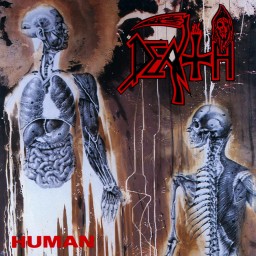
 luajaz
luajaz
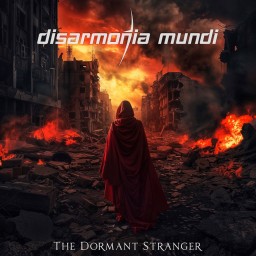
 Saxy S
Saxy S
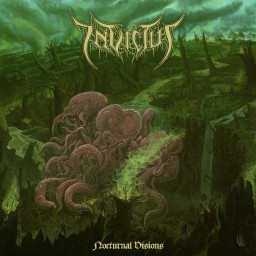
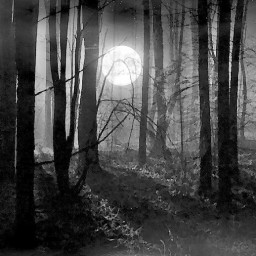 Sonny
Sonny
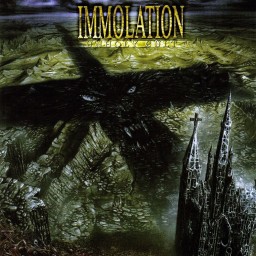
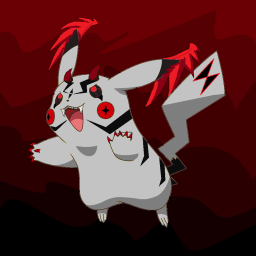 SilentScream213
SilentScream213
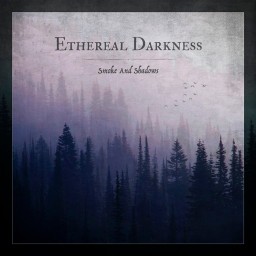
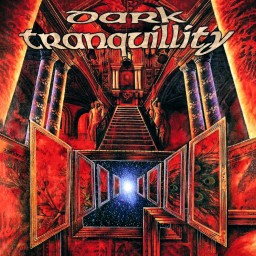
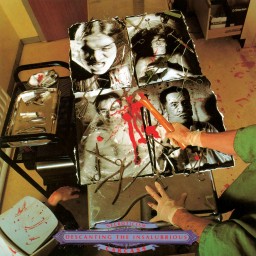
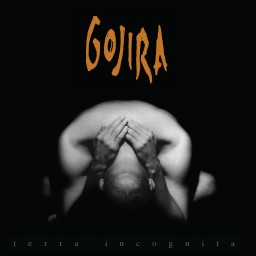
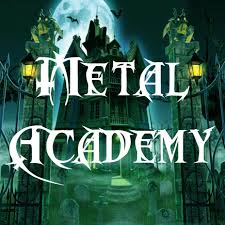 Daniel
Daniel
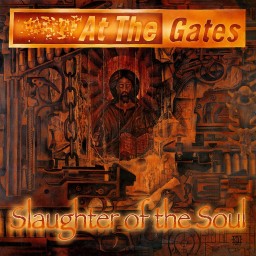
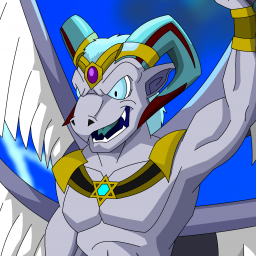 Rexorcist
Rexorcist
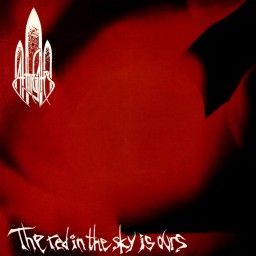
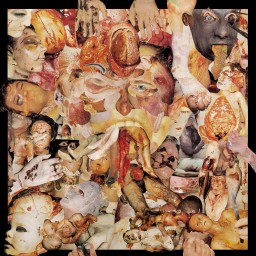
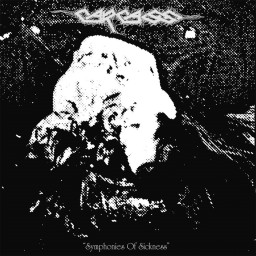
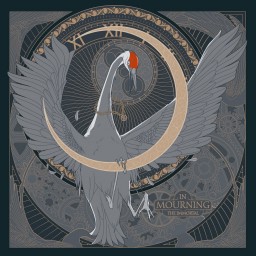
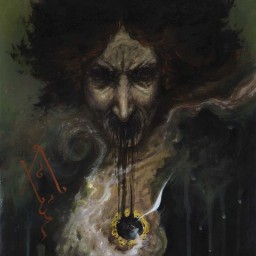 Vinny
Vinny

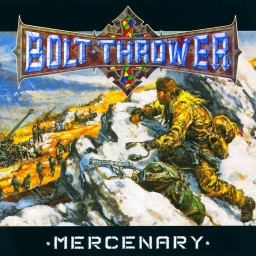
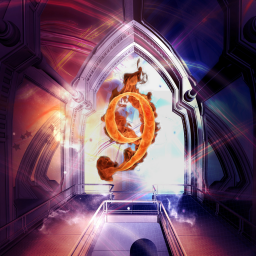 Shadowdoom9 (Andi)
Shadowdoom9 (Andi)
